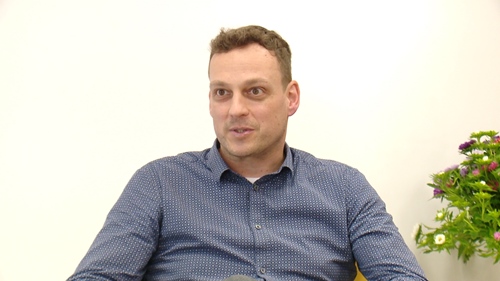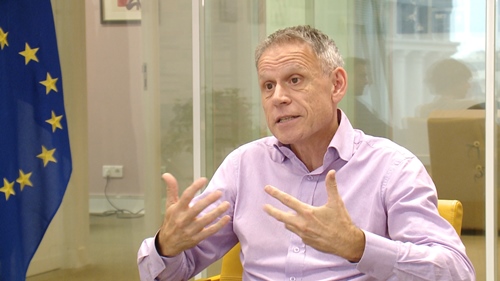Netherlands ready to support VN in improving the Mekong Delta’s resilience to climate change
VGP - The Mekong Delta Plan, the Agriculture Transformation Program and the studies on land subsidence are among remarkable achievements in Viet Nam-Netherlands cooperation in response to water challenges and climate change, according to Dutch Embassy.
 |
|
Elsbeth Akkerman, Ambassador of the Kingdom of the Netherlands to Viet Nam - Photo: VGP/Thuy Dung |
an interview with the reporter of the Viet Nam Government Portal on the achievements, recommendations and the continuous working agenda between the two countries to tackle and adapt to climate change in the Mekong Delta.
Viet Nam and the Netherlands have been severely affected by the climate change, and join hands in a long-lasting and trusted comprehensive bilateral partnership. In 2010 and 2014, the leaders of the two countries signed the Strategic Partnership Agreements (SPAs) in ‘Water Management and Climate Change’ and in ‘Sustainable Agriculture and Food Security’ respectively, with a special focus on the Mekong Delta.
In 2013, the establishment of the Resolution 120 showed the strong commitment of the Vietnamese government in finding nature-based solutions to develop the Mekong Delta in a more sustainable way, said Elsbeth Akkerman.
‘We are closely cooperating with Viet Nam to jointly find nature-based solutions and opportunities in water management and agriculture to develop an economically resilient and livable delta’ she added.
Meanwhile, Willem Schoustra, Agriculture Counselor for Viet Nam said that ‘We aim to use sustainable agriculture as an objective, but also as an instrument to adapt and mitigate climate change and to ensure a sound delta management. That makes our partnership so unique’.
Water and agriculture are closely interrelated, therefore, Viet Nam and the Netherlands work together to find solutions that can, for instance, embrace salinity and flood-based system into agro system. Water retention, water quality, water efficiency are also crucial for agriculture production as well.
Mr. Willem Schoustra, Agriculture Counselor for Viet Nam and Thailand - Photo: VGP/Thuy Dung
Significant achievements in VN-Netherlands cooperation in climate change adaptation

Ambassador Akkerman highlighted three important achievements in the cooperation between the two countries in climate change adaptation, including the Mekong Delta Plan, the Agriculture Transformation Program and the studies on land subsidence in the Mekong Delta.
‘The Mekong Delta Plan is a visionary document, which is long-term, integrated and calling for the coordination of the national and local government. More importantly, it offers a very good alternative from the strong hard infrastructure bias as well as helps finding smarter solutions”, she added.
The Mekong Delta Plan is a source of inspiration for Viet Nam to build the Resolution 120, the Ambassador highlighted.
Mr. Umans First Secretary Water Management and Climate Change explained that another significance of the Mekong Delta Plan is that it outlines the governance lessons learnt from the Dutch Delta experience. These refer to 5 key functions of the government: (1) Create the legal framework, (2) Ensure coordination among the whole-of-government, (3) Joint fact-finding and planning, (4) Delta finance with public and private investments and (5) Concrete delta programs and actions.
The Resolution 120 highlighted the importance of transforming to sustainable agriculture to adapt to climate change. In 2019, the prime ministers of Viet Nam and the Netherlands signed the Memorandum of Understanding on Agriculture Transformation Program (ATP) in the Mekong Delta.
The ATP aims to develop the mechanism based on the experiences that the Netherlands built based on its delta model but adapted to Viet Nam’s circumstances and system.
Mr. Schoustra referred to areas both sides are working on, along sustainable value chains in horticulture, live-stock, aquaculture, and to engage with different stakeholders in that process (local leaders, private sector and research institutes).
He expressed his hope the implementation plan of the ATP ready by half way this year and heading to the new phase of the cooperation.
Remarkably, in January 2021, the Letter of Intent (LOI) to establish the Mekong Delta Business Platform was signed between the Viet Nam Chamber of Commerce and Industry (VCCI) and four top sectors from the Netherlands in agro-food, horticulture, water and logistics. This platform is expected to stimulate public–private partnership (PPP) in the context of agro-water technology as well as agro-logistics to unlock all the production potential of the Mekong Delta for both domestic consumption and export opportunities.
According to Mr. Umans, one of the findings of the ‘Rise and Fall’ project show that the sinking of the Mekong Delta of 1-3cm/year, together with the sea level rise will result in a scenario that more than half of the delta will be below sea level by 2080. As a consequence, a huge investment will be needed to keep the sea out, he said, adding that the Netherlands will take forward the coastal erosion prevention planning with Vietnamese Government in the years to come to handle this issue.
Mr. Laurent Umans, First Secretary Water Management and Climate Change - Photo: VGP/Thuy Dung
Multi stakeholders approach, innovative finance mechanism–keys to climate change adaption

Ambassador Akkerman suggested Viet Nam should not only look at the growth figures but also looking at the quality consisting of sustainability and livability as an effort in coping with climate change.
Mr. Umans referred to the multi stakeholders approach (Dutch diamond approach), an effective mechanism in the Netherlands in response to climate change, which gathers the connectivity and integration of the government, private sector, research institutes and civil society organization (CSO).
He advised that we should stop seeing the Delta as having abundant resources of land, water, sand and biodiversity that can be exploited. He recommended seeing and treating the Delta as being a living body which the rivers are the blood veins, the floodplains are the bladder, the forests are the lungs while the mangroves are kidneys that filter the water. Therefore, the nation has to manage the resources in a sustainable way so that the future generations can also benefit from those resources.
Sharing an innovative finance mechanism applied in the Netherlands for the coming 20 years, Mr. Umans stressed the Dutch Delta fund by which US$1 billion will be available every year to co-finance activities with the target of building a healthy Delta. The fund can co-finance national, provincial or local programs or even programs from the water boards that we have in the Netherlands.
Viet Nam will need to develop its own mechanism to finance the resilience of the Mekong Delta, he said, adding that the Netherlands is willing to inspire Viet Nam by its examples on financing and to collaborate with the government to improve public funding and attract private funding.
By Thuy Dung

